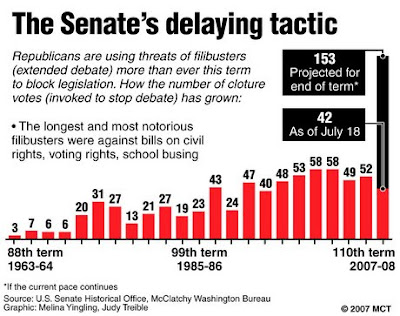
Do you believe in democracy? That's the question to ask Republican friends.
Many avowed conservatives will say "We're not a democracy. We're a constitutional republic." This is nonsense. True, America isn't a direct democracy, as ancient Athens was (if you didn't count its slaves). But of course we're a kind of democracy--as our Constitution mandates. "Democracy" doesn't mean "Direct Democracy." That's just one kind. We're a representative democracy--another kind, included in the basic dictionary definition of "Democracy."
Once you've batted down that detour, ask once again "Do you believe in democracy?"
This is crucial, because nearly all the Republicans in the U.S. Senate have demonstrated that they don't believe in democracy.
The Senate's 41 Republicans don't represent 41% of the voters. They represent about a third, due to the fact that Montana gets the same number of senators as California, and the most populous states (Texas notwithstanding) are mainly Democrat majority, while the least populous states (Delaware notwithstanding) are mainly Republican majority.
So now we have the disaster of one third of the American people being able to dictate legislation to the other two thirds. Nothing in the Constitution's careful set of checks and balances envisions or supports this kind of minority rule.
Do Republicans really believe it's better to have minority rule of this sort than for the other party to get to enact the legislation it was elected to enact?
Say you're a doctrinaire Republican--opposing "big government," deficit spending, expansion of the federal government, foreign involvements except when absolutely necessary, and social issues such as abortion.
Say the party in the majority would, given its way, enact legislation that goes against all of this.
Then would supporting your agenda and opposing theirs justify, in your mind, destroying our democratic form of government?
A key component of an advanced democracy is the losing side accepting defeat. The Republican Party leadership has decided not to do this. Gridlocking the United States Senate is just one example of this new policy--the policy of the permanent campaign, of demonizing the other side, of claiming that the Republican Party's ends justify the means now being used.
Remember the Republican reign of Congress from 1994-2006? Time after time they railed against Democrats using a lightweight version of the Republicans' gridlocking tactics, demanding that judicial confirmations and a lot more go to "an up or down vote." Now the Republicans have abused Senate rules about filibustering to block 70% of Democratic legislation and personnel confirmations. They're preventing over 2/3 of Senate work from reaching that "up or down vote."
So ask your Republican friends: "Do you believe in democracy? Because your party's leadership doesn't. And if you actually believe in democracy, pressure your party's leadership to follow suit and quit blocking everything."
Note that I'm not saying this because I want everything the Democratic Party wants. I don't, as this blog's other entries demonstrate. But I do want to live in a democracy, and I'm willing to pay the price of not getting what I want all the time in order to reap the benefits of living in a democracy. Are Republicans?
If not, they've morphed from a political party into a primitive tribe in which tribal loyalty trumps principles.
